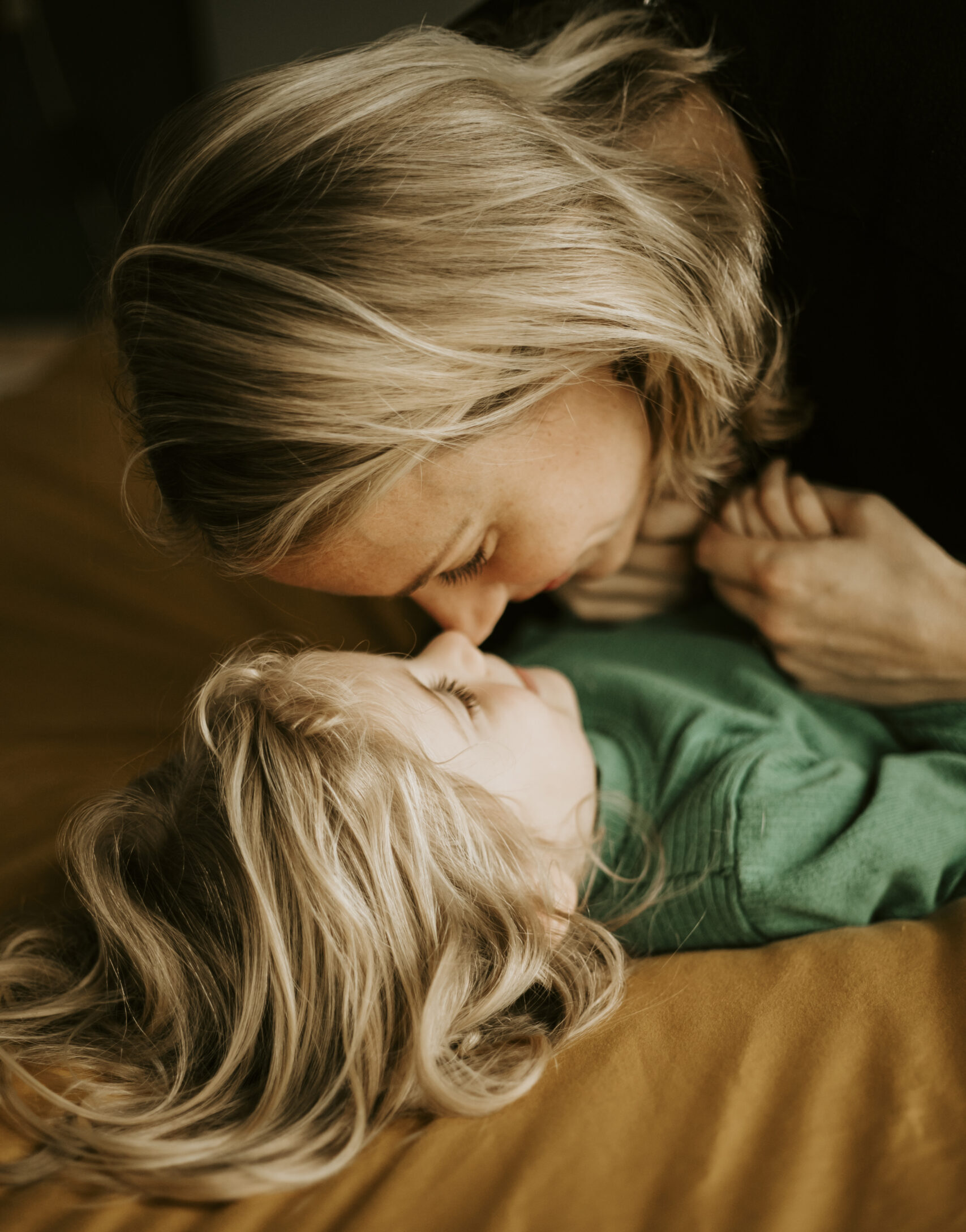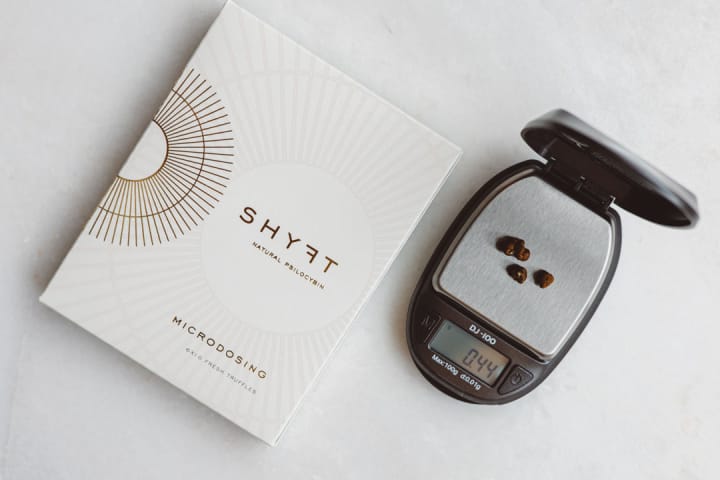
✦ Enjoy free shipping in the Netherlands for orders above €50
From sleepless nights to emotional overload, it’s easy to feel like you’re running on empty. There’s no one-size-fits-all solution, but more and more mothers are turning toward nature for support. One of the tools that’s quietly gaining popularity? Microdosing.
This practice — typically involving a very small, sub-perceptual amount of psychedelic truffles — isn’t about escaping the responsibilities of parenthood. It’s about meeting them with greater presence, emotional awareness, and softness.

At SHYFT, we’ve seen firsthand how powerful this practice can be, especially when approached with care and intention. Our owner, Freke van Nimwegen, has not only experienced this herself, but also coaches women who are exploring microdosing during different phases of motherhood. She has been interviewed by RTLnieuws and magazine Kek about this topic, so it’s about time we share something about it here at SHYFT.
“The most common feedback is that they feel less rushed. They no longer pass by life carelessly and are more aware of the precious time with their children. A lot of mothers feel more patient after microdosing for a while.”
Modern motherhood is often a balancing act between doing and being. There are always lunches to pack, work calls to make, laundry to fold – and it’s easy to lose yourself in the checklist. Microdosing can act as a gentle reminder to slow down and come back to yourself.
Freke described how the practice helped her connect more honestly with their children and their emotions:
“Before, I was not so aware of my feelings. I was taking care of my children but at the same time feeling restless. Microdosing has helped me a lot to embrace my emotions and own needs. And it’s very liberating to express how I feel to my partner and children. My daughter picks up on that. She no longer feels insecure about her own emotions. I’ve seen her self-confidence grow.”
Or how it softened her relationship:
“We are much more connected and understanding towards each other. If he’s not feeling well after a sleepless night, I approach him much more kindly and gently. We became better at holding space for each other. Every bit deserves attention.”
Still, it’s not always easy:
“It opens you up to more consciousness. Which often also means more confrontations with yourself. So it’s necessary to approach this process with softness and self-love. That’s why it’s so important to combine microdosing with practices like journaling and meditation.”
Freke explains it like this:
“Microdosing brings you more in touch with your body, your heart, your feelings. It’s as if you can notice your intuition, ‘the whispers’ better. Sometimes people do need support in this, because if you’re in survival mode and also only have been taught to approach life from the mind, it’s quite a shift to make.”
She describes it not as a fix-all, but a subtle support system:
“It’s like cycling on an electric bike. It gives you support, but without pedalling, nothing happens.”

While research into microdosing is still growing, early studies and anecdotal reports point toward potential benefits in areas like emotional regulation, creative thinking, and a greater sense of connectedness. A 2021 study published in Scientific Reports found that participants who microdosed reported higher levels of psychological well-being and improved mood compared to non-microdosers.
Still, it’s important to emphasize that microdosing is not a cure, and it’s not for everyone. Especially during pregnancy and breastfeeding, safety is a top concern. While some mothers report positive experiences during these periods, there is currently not enough research to confirm whether microdosing is safe while breastfeeding or pregnant.
Always consult a qualified professional if you’re considering exploring this path.
With inspiration from James Fadiman and support from the Microdosing Institute, a group of women came together to create a project designed to explore the real-life experiences of mothers and microdosing.
Organized by Naomi Tolson (the Psychedelic Doula) and Mikaela de la Myco (creator of mushWOMB), the Mothers of the Mushroom Survey was launched to investigate the narratives around psilocybin use during pre-conception, pregnancy, postpartum, and breastfeeding.
“We wanted to gather what so many of us were feeling,” they explain. “This survey aims to make a measurable shift in the assumption that mushrooms are harmful during these phases of life — or that their benefits should be ignored.” (Mothers of the Mushroom, 2025)
While this survey isn’t clinical research, it’s an important first step in building a body of lived experience and collective insight — especially in a field where formal studies are still catching up.
The preliminary findings, based on self-reported stories, describe benefits across four main areas: Postpartum & Breastfeeding, Parenting, Personal Well-being, and Mental Health. Some of the quotes shared by participants include:
“Decreased back pain, decreased nerve pain.” (Tolson & de la Myco, 2025)
“Less repulsed with breastfeeding.” (Tolson & de la Myco, 2025)
“It made a huge difference for my child because I was a more patient, present parent and he was so much happier because I was happier.” (Tolson & de la Myco, 2025)
“I wish I had the correct support and guidance to microdose during pregnancy.” (Tolson & de la Myco, 2025)
The survey team also began collecting birth outcomes from those who reported ingesting psilocybin while pregnant.
Of 178 mothers who said they used during pregnancy, birth outcomes were collected from 14. All reported newborns were healthy at birth, with “no significant deviations from population norms in weight, length, or overall condition.”
Again, while these findings are not clinical and must be viewed as anecdotal, they are a powerful reflection of the stories being lived and shared by mothers in this evolving space.
If you feel inspired by the Mothers of the Mushroom project and want to support their important work in changing the conversation around psychedelics and motherhood, you can contribute to their GoFundMe campaign here, and explore the full report here.
Another beautiful place to start is Moms on Mushrooms — a supportive platform that helps mothers explore intentional microdosing within a nurturing and like-minded community. It’s not about doing it all perfectly. It’s about reclaiming space for yourself in a role that so often asks you to give all of you.
If you’re feeling curious, you’re not alone. More mothers are asking these questions, sharing their stories, and seeking a sense of connection & guidance.

At Shyft, we don’t see microdosing as a solution — we see it as a tool. A way to soften the edges, reconnect to your own rhythms, and feel a little more like you again.
It’s subtle. It’s natural. And when approached with intention and self-awareness, it can be a meaningful support on the rollercoaster of motherhood.
Curious to Try Microdosing?
Our microdosing starter kit includes everything you need to begin safely and intentionally — including natural truffles, a protocol guide, and the SHYFT Microdosing Manual.
And remember: you don’t need to do this alone.
If you’d like to be supported by Freke, you can find her microdosing coaching here.
Disclaimer: This article is for informational purposes only and does not constitute medical advice. Microdosing is not recommended during pregnancy or breastfeeding without medical supervision. Always consult a healthcare professional before starting any new wellness practice.
GoFundMe. (2024). Mothers of the Mushroom. https://www.gofundme.com/f/mothers-of-the-mushroom
Kek Mama. (2024). Deze mama doet aan microdosing. https://www.kekmama.nl/artikel/persoonlijk/mama-doet-aan-microdosing
Moms on Mushrooms. (2024.). Get started. https://www.momsonmushrooms.com/get-started
Mothers of the Mushroom. (2025). Psilocybin research & resources for families. https://www.mushwomb.love/mothersofthemushroom
Root, M. J., Ataya, A. F., & Ermakova, A. O. (2021). Adults who microdose psychedelics report health-related motivations and lower levels of anxiety and depression compared to non-microdosers. Scientific Reports, 11, 21926. https://doi.org/10.1038/s41598-021-01811-4
RTL Nieuws. (2024). Freke van Nimwegen over microdosing als moeder. https://www.rtl.nl/lifestyle/artikel/5436469/microdosing-freke-psychedelische-truffels-lsd-paddos-onderzoeker-kim
Tolson, N., & de la Myco, M. (2025.). Mothers of the Mushroom: Citizen science for psychedelic families [Presentation]. mushWOMB & The Psychedelic Doula. https://www.canva.com/design/DAGk7doqs7s/vkeE5HXg1B8ruDkwsNhdKQ/view?utm_content=DAGk7doqs7s&utm_campaign=designshare&utm_medium=link2&utm_source=uniquelinks&utlId=hcdf15f4a8c

Joana is a psychology student and wellness enthusiast. She explores the connections between nature, body, and mind, deepening our understanding of how the three can merge to support well-being.